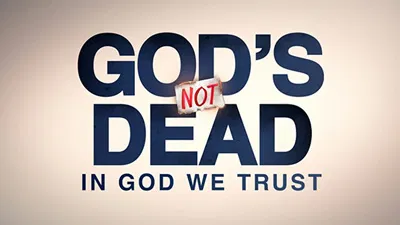
Movie Review: The Unbelievers Are Unbelievable
Atheists inherently know the God of the Bible exists, so the question should be, “Why do you willfully suppress what you already know is true?”
It was a rainy Monday evening when I arrived on the campus of my alma mater, Ohio State University, to watch the movie The Unbelievers. The movie was an insider look at the travels and ideas of famed atheists Dr. Richard Dawkins and Dr. Lawrence Krauss as they traverse the world in their crusade “against religion and for science.” Many of the moviegoers proudly wore shirts emblazoned with a red letter “A” for atheism, and some even brought their children. Dawkins and Krauss were present at the event and participated in a Q&A after the showing.
The tagline for the movie was, “What are you willing to believe?” but that is not really the correct question. Atheists inherently know the God of the Bible exists, so the question should be, “Why do you willfully suppress what you already know is true?” (Romans 1:18).
The executive director of the Richard Dawkins Foundation began the evening by saying that the foundation desires to further the goals of Dawkins himself, including getting “as many atheists elected to office as crazy creationists.” This statement was met with resounding applause—at least by everyone but me!
A good portion of the movie—perhaps 50%—consisted of watching Dawkins and Krauss traveling in cars, trains, and airplanes; watching them walk on to stages to thunderous applause; and talking on the phone or interacting with people in which we only heard snippets of what they were saying. It seemed to be an attempt to portray them as tireless crusaders who deserve rock-star status.
One of the main themes of the movie—elucidated by Krauss on several occasions—was that he wanted people to have permission and be open to question everything. However it was obvious that this did not apply to questioning Dawkins and Krauss—or if you did question them and came to different conclusions then you should be ridiculed. They spent quite a bit of time in the movie and the live Q&A that followed the showing to promote the importance of ridicule as a way to deal with people that disagree with the “facts” of evolution and billions of years.
Dawkins said that religious claims about the universe need to be substantiated, and if they can’t be then people that believe those claims should be ridiculed with contempt. Krauss was a little more congenial on this point saying it really depended on the situation whether or not a person should ridicule others and that one ought to be careful to ridicule ideas and not the person. (Atheists rarely follow this advice and contrarily use ad hominem attacks against those that disagree with them). Krauss even said he knew excellent scientists that were also highly religious. I was glad to see him admit this since Bill Nye, during the recent debate with Ken Ham, refused to respond to the many examples of great scientists who were also biblical creationists.
Defining Science
By far the biggest fallacy in the movie was the equivocation of observational science with historical science. One example of this was when Dawkins, in trying to correct what he considered people’s false views concerning evolution, said that there was never a first rabbit or first human—that everything born from its parents looks like it parents. He explained the reason for this is that change is so slow and gradual that it is imperceptible. Of course this excuses evolutionists from having to find fossil evidence of evolution (so-called transitional forms) because the changes are so minute that they presumably wouldn’t be detectable in the fossils. Dawkins compared it to watching the hour hand on a watch: the hour hand moves but the movement is in such small increments that it is difficult to perceive. However, there is a big difference in the hour hand moving on a watch, which is observable, and the changes that have purportedly happened in organisms over long periods of time. The latter is historical and not observable and based solely on assumptions about the past since evolutionists have no eyewitness account of those billions of years.
Krauss talked about the history of science while wandering through some type of museum looking at past inventions like light bulbs. He talked about the importance of observation and experimentation that presumably past scientists used to discover and invent things like light bulbs, and he identified the need to preserve this legacy. Yet again, the inventions and discoveries of the past are examples of good observational science but are not historical science.
What discoveries are not being made in our modern world because so many scientists have decided that the universe and every living thing is just the result of random chance.
In the Q&A time a man posed a question related to past scientists being theists and whether believing in God was important for their desire to pursue science because they believed there was order in the universe. Dawkins replied that it likely was historically true that people thought if there was a Lawgiver then there should be laws to study. He even said a person might have been a better scientist if he or she was a theist versus believing everything came about by random chance because then there would be no reason to study it—which forces the question of why he studies it if it’s the result of random chance! However, Dawkins said that just because it was historically true that many scientists were theists, that doesn’t necessarily make religion true. Krauss added that science grew out of religion like people grow out of believing in Santa Claus. But I shudder to think what the world would be like without the discoveries of people like Isaac Newton, Louis Pasteur, and many others who believed in God and His Word as truth and sought to understand the world He created. What discoveries are not being made in our modern world because so many scientists have decided that the universe and every living thing is just the result of random chance (e.g., consider the case of “junk” DNA)?
Defining Morality
During the Q&A, a woman asked how atheists should define morality. She said the principle she uses is to seek that which causes the least pain. Dawkins agreed that reducing suffering is a good principle, and that’s why killing your neighbor is wrong. He said that saying you need religion to be good is grotesque and that being able to empathize with those that are hurting is a gift given to us by our Darwinian heritage. I had to wonder how this “gift” fits with the evolutionary principle of survival of the fittest and even Dawkins’s own book, The Selfish Gene.
Krauss agreed with Dawkins affirming there can be no absolute morality and asserting that the context determines what is moral. For example, he said humans are hardwired to find incest repulsive and he seemed to relate it to the fact that children from such relationships are more likely to have genetic defects. Krauss said he believes that if a brother and sister want to have a sexual relationship and they use contraception, he wouldn’t be able to say it’s wrong. The crowd was amazingly quiet during his explanation and I didn’t see nodding heads or hear anyone clapping. However, I was tempted to applaud because he was being fairly consistent with an atheistic worldview that has no ultimate standard for morality.
Defining Meaning and Purpose
In the movie Dawkins asks, “Why do we exist? What is the purpose?” He states that these are silly questions and that, in the truest sense, there is no meaning and purpose. We should simply try to leave the earth better off than it was before we existed. Krauss even said we should celebrate the fact that we are more insignificant than we thought and we need to create our own meaning and purpose.
During the Q&A, I got the impression that the idea of no true meaning and purpose in life is a difficult concept for atheists to accept. One man in the audience asked how he could comfort his wife whose parents had recently died if he truly believes she will never see them again. Krauss encouraged him to show her compassion, care about her, love her, and not to push his views on her. Dawkins warned that a belief in life after death is not benign because if there is life after death then many people are going to hell. He also said that the idea of eternity is alarming, and admitted personally if there is life after death he wants to spend it under general anesthetic.
Another person asked how to help people who are depressed and anxious presumably because there is no meaning and purpose in life. Krauss said that our existence is the one chance we have to make meaning and purpose for ourselves and that it’s okay if there’s no real purpose. Dawkins said we are lucky that we are going to die because dying means we were born and what a privilege it is to be here.
In the cases of both morality and meaning and purpose, I kept wanting to ask Dawkins and Krauss the question, “But why? Why can’t I kill my neighbor and other people if there is no absolute morality? If I create my own meaning and purpose, why can’t my meaning and purpose be to kill people?” They contradict themselves when they say there is no absolute morality and then turn around and say that killing your neighbor is wrong or not using contraception in an incestuous relationship is wrong. Without the God of the Bible and the love of Christ, they have no hope, peace, comfort, or even consistent, logical answers to offer people.
Conclusion
The Unbelievers made the hatred that Dawkins and Krauss have toward religion—especially the God of the Bible—very apparent. Dawkins said science is beautiful and wonderful and that religion was dull, boring, and petty. Krauss sees himself as “launch[ing] out against the forces of evil [referring to religion].” When he said that, I immediately thought of this passage from Isaiah 5:
Woe to those who call evil good, and good evil;
Who put darkness for light, and light for darkness;
Who put bitter for sweet, and sweet for bitter!
Woe to those who are wise in their own eyes,
And prudent in their own sight! (Isaiah 5:20–21)
In a 2013 interview about the movie Dawkins and Krauss said Christians should not feel “threatened” by their efforts to expunge religion from human history. But Dawkins states in the movie that he hopes someday atheists won’t have to distinguish themselves as atheists because everybody will believe that way. In the Q&A he stated his belief that the majority of society will be atheists in a very short period of time. Dawkins said he is “consoled” by the short amount of time it took for homosexuality to be accepted by society.
Before the event began and I was looking out over the audience, I thought about the fact that I was in a room full of people who most likely were going to hell. I prayed for them and especially for the children and young people, that God would open their hearts and minds to the lies and falsehoods of atheism and the truth of Himself and His Word. I pray that parents, grandparents, Sunday school teachers, pastors, and others will take advantage of our Kids Free in 2014 offer at the Creation Museum. Equip yourself and the children and young people in your life to know that God’s Word is true from the very first verse and that, while the bad news of sin is in Genesis, the good news is in Jesus Christ.
Recommended Resources

Answers in Genesis is an apologetics ministry, dedicated to helping Christians defend their faith and proclaim the good news of Jesus Christ.
- Customer Service 800.778.3390
- © 2025 Answers in Genesis







